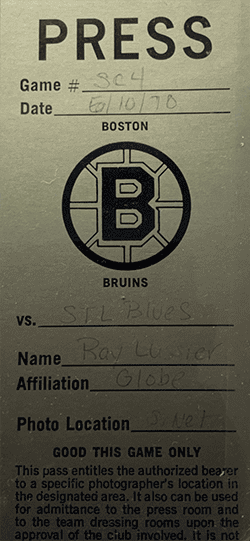One of the main reasons I love collecting tickets is because there is great arbitrage value — especially when the buyer knows something the seller does not.
Being aware something historic happened at a certain game and then getting that ticket graded could yield a turnaround of thousands of dollars.
That said, there are also sellers who know collectors are seeking this advantage and play the game in reverse.
A press credential sold on eBay for $76. on Wednesday night. It was listed as "Bobby Orr 'Flying Goal' Ticket Press Pass 1970."

Now, Orr's flying goal is one of the greatest moments in hockey history and represents an iconic collectible that I'd love to own. So, I went deep in my evaluation to decide if I should bid on this lot.
Let's take it step by step with the questions I asked as I investigated:
1. Does the item appear authentic?
The credential certainly looks like it could be an old pass, though the gold color seems to be a little aggressive for the 1970s. I would expect it to be a mustard yellow.
The writing looks authentically faded. It has the markings of what would make sense with the game being "SC4" (Game 4 of the Stanley Cup final) and it being versus the "STL Blues."
2. Can you make the leap the item is from the game listed?
All the details on the press pass are hand-written, which leaves it more open to fraud than an item with all the elements printed on it. In fact, PSA won't grade a generic pass with no printing based solely on write-in details like we see here.
The description makes it sound as if the pass was found. Here is how the seller describes how he came upon this: 'We are a junk removal business in South Boston. Any items you see we found in a house cleanout. We do not claim that all used items work, and that all items are authentic. Please use your best judgment. Some items come w/ a story. Others do not. We offer no guarantees and no refunds. If you simply don't agree, please don't bid."
The seller then goes on to say, "This appears to be the real deal, folks! An original press pass from May 10, 1970 ... this came out of a home in Boston, Massachusetts, last month. I assume it's real, but I'm not a sports guy."
These are worse disclaimers, and I often don't bid when people say, "There's no guarantee it's real and if it's not," or "there are no refunds!" I often feel like they are saying, it's definitely not real.
3. How easy is the item to fake?
I always like to ask this question: Could I get this from scratch and make it myself?
That was my first red flag here. There are blank passes exactly like this on eBay for sale.
Knowing Game 4 of the 1970 Stanley Cup final is the most valuable creates more doubt. If this pass is real, it probably would be worth around $15,000.
4. Go over everything very closely
Here's where you have to question all the details.
Let's start by looking at the Boston Bruins logo. A quick check shows the Bruins logo didn't change from the late 1940s to 1995. I found the 1970 Bruins media guide and quickly realized this item likely wasn't from 1970. Why? Because in 1970, the points emanating from the "B" were filled in black, not empty spaces as they are in this pass.
And then I found my biggest red flag, which caused me to steer clear of this lot.
The name listed on the pass is LUSSIER. Ray Lussier is the photographer who took the Flying Goal shot. That detail would make this press pass worth even more money.
However, Lussier's affiliation is listed as GLOBE. He didn't work for the Boston Globe. He worked for the Boston Record-American.
This item definitely does not pass my authentication test. And based on that low final sales price, I wasn't alone in that assessment.
Darren Rovell is the founder of cllct and one of the country's leading reporters on the collectibles market. He previously worked for ESPN, CNBC and The Action Network.

